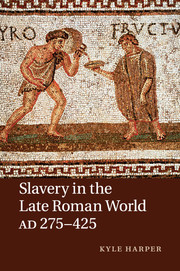Book contents
- Frontmatter
- Contents
- List of tables
- Acknowledgments
- PART I THE ECONOMY OF SLAVERY
- PART II THE MAKING OF HONORABLE SOCIETY
- PART III THE IMPERIAL ORDER
- Introduction
- 9 Citizenship and civil conflict: slave status after the Antonine Constitution
- 10 The enslavement of Mediterranean bodies: child exposure and child sale
- 11 The community of honor: the state and sexuality
- 12 Rites of manumission, rights of the freed
- CONCLUSION
- APPENDIXES
- Bibliography
- Index
11 - The community of honor: the state and sexuality
Published online by Cambridge University Press: 05 August 2011
- Frontmatter
- Contents
- List of tables
- Acknowledgments
- PART I THE ECONOMY OF SLAVERY
- PART II THE MAKING OF HONORABLE SOCIETY
- PART III THE IMPERIAL ORDER
- Introduction
- 9 Citizenship and civil conflict: slave status after the Antonine Constitution
- 10 The enslavement of Mediterranean bodies: child exposure and child sale
- 11 The community of honor: the state and sexuality
- 12 Rites of manumission, rights of the freed
- CONCLUSION
- APPENDIXES
- Bibliography
- Index
Summary
“THE CHILD OF THE SLAVE-WOMAN”: A BRIEF HISTORY
The patriarch Abraham had a son, Ishmael, by the slave-woman of his barren wife. When God made his wife fertile, the slave-woman and her son were unceremoniously “sent away.” The Abraham scenario was paradigmatic in a way that transcended the millennia, across radically different epochs of history and radically different formations of state and society. The Abraham story, with its polarities between free wife and slave-woman, free son and slave son, inheritance and disinheritance, provided theologians and preachers with a stock of powerful metaphors that resonated in the experience of their audiences. But within the constant re-telling of the story, slight variations of detail charted underlying change in the way that this tale of slavery, sex, and inheritance was received by people of the book.
Around ad 54 the apostle Paul re-worked the story in his letter to the Galatians. Paul wrote in the idiom of customary practice in the eastern Mediterranean. In his hands, the story of the nomadic patriarch was translated into the culture of the Greek city. Paul stressed the similarity of free and slave sons, especially before the free son's assumption of majority.
- Type
- Chapter
- Information
- Slavery in the Late Roman World, AD 275–425 , pp. 424 - 462Publisher: Cambridge University PressPrint publication year: 2011



